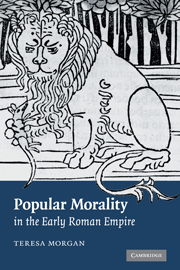Book contents
- Frontmatter
- Contents
- Preface
- List of illustrations
- List of tables
- List of abbreviations
- 1 Introduction
- PART ONE
- 2 Proverbs
- 3 Fables
- 4 Gnomai
- 5 Exempla
- 6 Patterns
- PART TWO
- PART THREE
- Conclusion
- Appendix 1 The political and literary connections of Babrius
- Appendix 2 The definition of a miscellany
- Appendix 3 Popular morality and philosophical doctrine
- List of papyri
- Bibliography
- Index
2 - Proverbs
Published online by Cambridge University Press: 27 October 2009
- Frontmatter
- Contents
- Preface
- List of illustrations
- List of tables
- List of abbreviations
- 1 Introduction
- PART ONE
- 2 Proverbs
- 3 Fables
- 4 Gnomai
- 5 Exempla
- 6 Patterns
- PART TWO
- PART THREE
- Conclusion
- Appendix 1 The political and literary connections of Babrius
- Appendix 2 The definition of a miscellany
- Appendix 3 Popular morality and philosophical doctrine
- List of papyri
- Bibliography
- Index
Summary
The best things come in small packages.
English proverbThe study of proverbs has been of only intermittent interest to classicists, which is surprising given that several useful collections and editions were made in the nineteenth century, and that across other ancient and modern cultures, proverbs are the subject of a vast and expanding body of scholarship. It would be possible, and might be highly instructive, to base an entire study on a comparison of Greek and Latin proverbs with those of surrounding societies, or with the societies, European and Arab, which inherited them. I shall make a few such comparisons in Chapter Six, but in this chapter I confine myself to some influential modern discussions of the nature and definition of the proverb, by way of establishing some working parameters for our collection in Greek and Latin.
Modern proverb scholarship began with the work of Archer Taylor in the 1930s. Taylor early recognized the special difficulty of the field, which is that while everyone knows a proverb when they hear one, and among any group of people (even scholars) there is a high level of agreement about whether a given saying should be counted as a proverb, it remains very difficult to say precisely what a proverb is. For this reason Taylor resisted detailed definitions, offering tersely in The Proverb, ‘A proverb is a saying current among the folk.’ This minimalist definition conceals a cluster approach which Taylor used in practice.
- Type
- Chapter
- Information
- Popular Morality in the Early Roman Empire , pp. 23 - 56Publisher: Cambridge University PressPrint publication year: 2007



